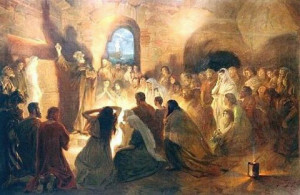Politicians are elected and paid to represent the will of their particular electorate, their constituency. That is as it should be in a Republic, such as we have in America. But a politician’s constituency is usually quite large. A Senator’s constituency is one of the fifty states. A congressman represents the people of his district. A mayor works for the people of his city. A president usually seeks to represent all the people of the United States. (Sadly, however, some politicians use their office only to satisfy their own unlawful, immoral appetites.) But when your constituency is so large, it is nearly impossible to satisfy everyone.
A Christian, on the other hand, really only has but one constituency. It is true that as we live the Christian life we should consider others and not go out of our way to offend or seek conflict. We should try to please our neighbors and help to bear their burdens and not seek to please ourselves (Rom. 15:1-3; Gal. 6:2). We should always reply with a soft answer (Prov. 15:1). Our speech should always be spoken with grace, our answers seasoned with salt (Col. 4:6). We should, as a matter of principle, try to get along with others, even taking the wrong if necessary (Matt. 5:39; I Cor. 6:7). But, in the end, when it comes to right and wrong, when it comes down to truth or error, when eternal life and eternal damnation are in the balance, we have a constituency of but One, that is, God.
Paul wrote, “Study to shew thyself approved unto God, a workman that needeth not to be ashamed, rightly dividing the word of truth” (II Timothy 2:15). Our goal as Christians and as gospel preachers should be to please God, not men. To that end, we study and work and rightly divide the word of truth. Our understanding, our preaching and teaching and our actions should not be influenced by how others will respond to the truth. Preachers forsake their obligations when they try to please everyone instead of focusing on teaching the truth that man needs. People will always want to have their itches scratched and they will find a man to do it if they can, but faithful gospel preachers will not succumb to that temptation (II Tim. 4:1-5).
Again, after expressing dismay that brethren in Galatia had so quickly allowed error to creep in amongst them, Paul wrote, “For do I now persuade men, or God? or do I seek to please men? for if I yet pleased men, I should not be the servant of Christ” (Gal. 1:10). For many Christians and preachers, popularity and acceptance are more precious than truth or serving Christ. No one wants to be disliked but if that is the price for pleasing God, then so be it. Many errors have been promulgated in the name of Christ because some weak-minded Christians have wanted to either entice or appease the sinner. Many have not learned the lessons that James taught: “Ye adulterers and adulteresses, know ye not that the friendship of the world is enmity with God? whosoever therefore will be a friend of the world is the enemy of God” (James 4:4).
Others teach things they ought not for filthy lucre’s sake (Tit. 1:10,11). How many sermons have been altered or not preached at all because the preacher was afraid he would lose his position if he spoke the truth? “They that are such serve not our Lord Jesus Christ, but their own belly; and by good words and fair speeches deceive the hearts of the simple” (Rom. 16:18). How many elders have asked the preacher to not preach the truth because they were afraid they would lose members, and thus lose money, if the truth was spoken (Tit. 1:7). Thank God for preachers who will preach the truth regardless of what others may say, even though it may (and often has) cost them their positions (II Tim. 4:2). Thank God for elders who demand their preachers speak the truth regardless of what some members may say or do.
Like Israel of old, too many brethren today trust in the shadow of Egypt (Is. 30:1-7). They take counsel, but not of God. Isaiah described their attitude: “this is a rebellious people, lying children, children that will not hear the law of the LORD: Which say to the seers, See not; and to the prophets, Prophesy not unto us right things, speak unto us smooth things, prophesy deceits: Get you out of the way, turn aside out of the path, cause the Holy One of Israel to cease from before us” (Is. 30:9-11). Some criticize us because we don’t keep up with the times or what the people will tolerate or the latest homiletical fads or social trends. They criticize those who teach doctrine instead of how to feel better about yourself; they despise those who would warn against error instead of embracing the denominational world as fellow-laborers; they turn up the nose to those who boldly wave the Banner of the Old Jerusalem Gospel instead of appeasing the populace with “community outreach.”
If preaching the Old Jerusalem Gospel is out of step with the times, then I am out of step with the times. Truth is, the Old Jerusalem Gospel has never been popular with the devil. As Christians, we should be concerned about how we walk and please God not men (I Thess. 4:1). Pleasing men is fine if it falls within the parameters of pleasing God first (Acts 5:29). God is our only real constituency.
Eric L. Padgett




